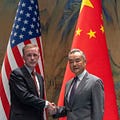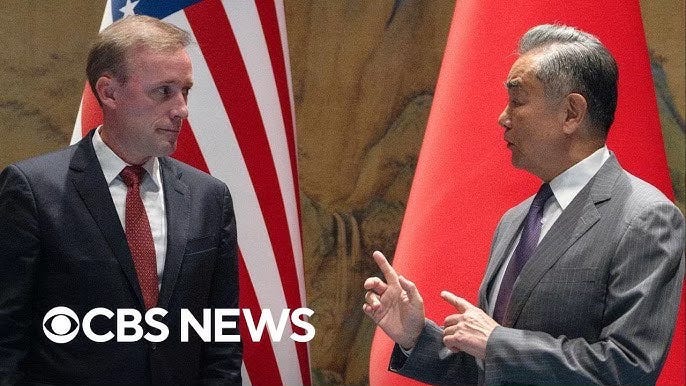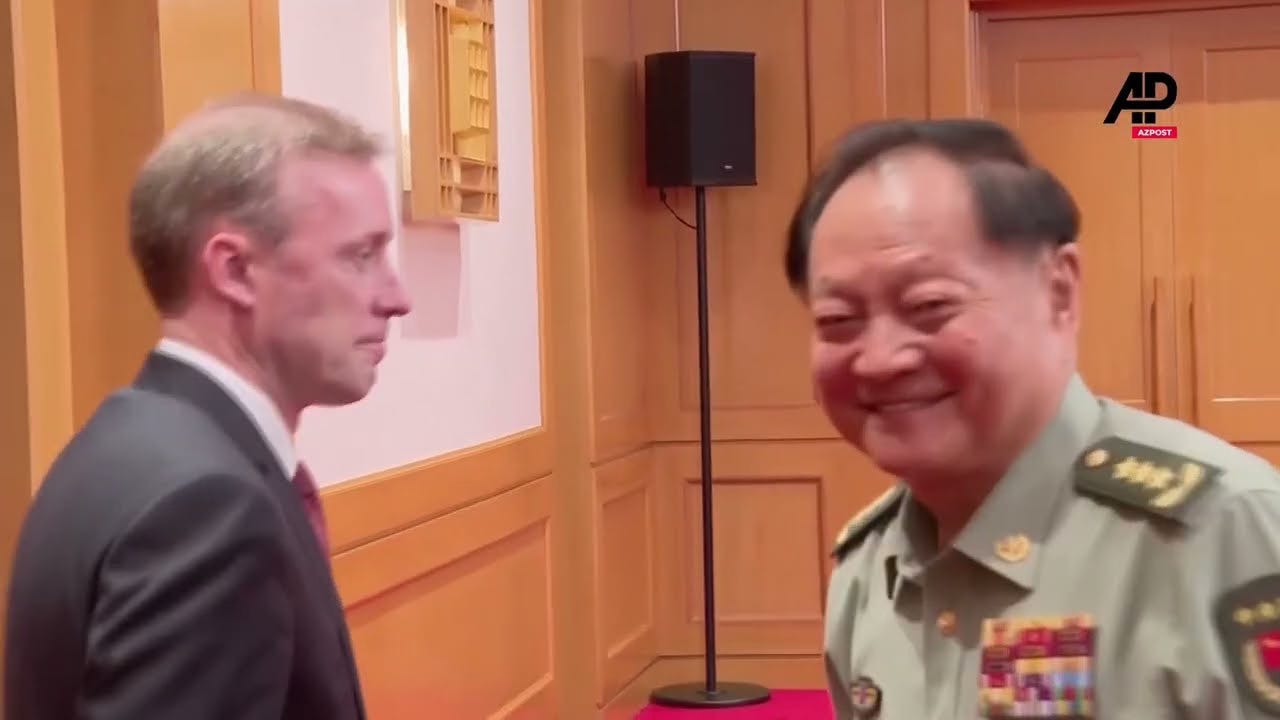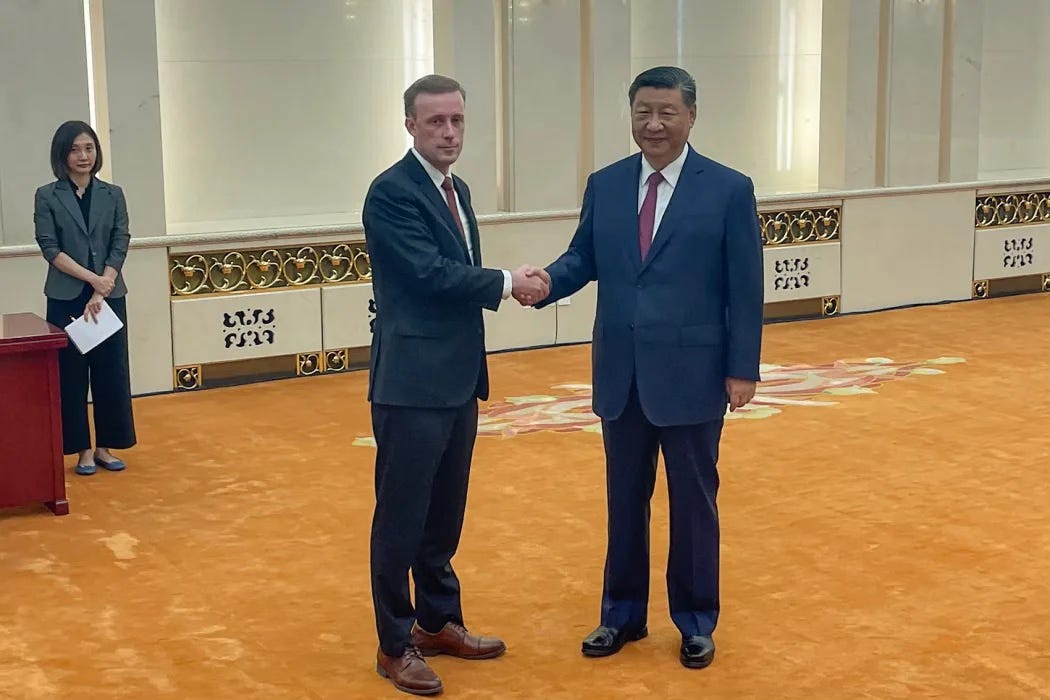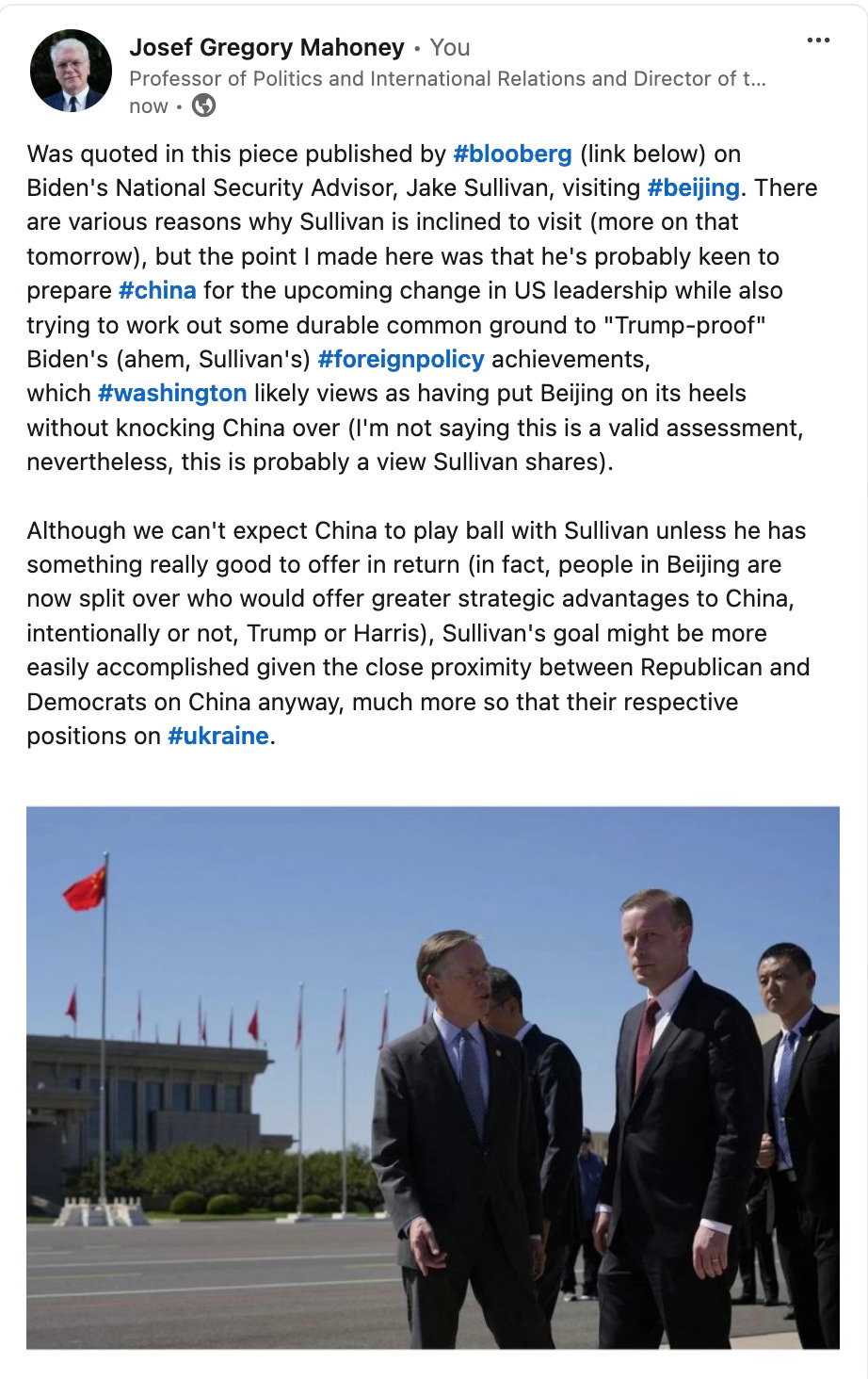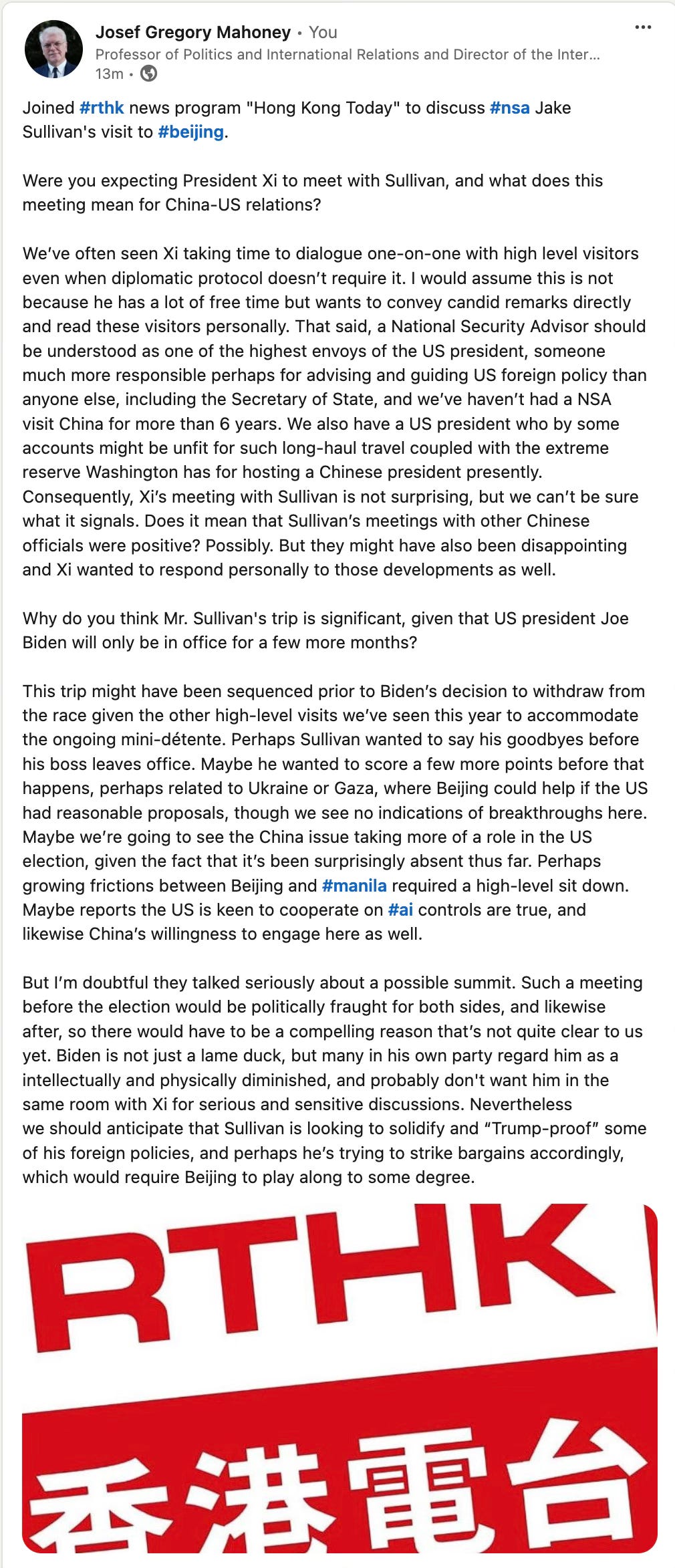Beijing smiles for Sullivan's "secret sauce"
Mahoney on Jake: Xi meets Jake, Wang Yi meets Jake, Zhang Youxia meets Jake, US admits that Jake's visit to Beijing failed on the issue of Ukraine. Are Washington's high hopes washed away?
Mahoney on Jake Sullivan
Featured columnist Prof. Josef Gregory mahoney joined #rti (#moscow) to discuss US #nsa Jake Sullivan's trip to #beijing.
The US has admitted that Sullivan's visit failed yet again to find common ground with China on the issue of Ukraine. Did Washington have high hopes ahead of the visit, or was such an outcome predictable?
Given the mess in #ukraine and #gaza and the significant shift in policies we'll see if #trump wins the election, the White House has a compelling reason to try to consolidate its positions and make them what some have described as "Trump-proof." While #china can play a constructive role in helping to resolve the conflicts in both place, I think it remains clear to Beijing that neither Biden nor Sullivan are ready to do so in meaningful ways. Perhaps given the recent developments around #kursk Sullivan hoped the ground had somehow shifted in Beijing, but that would be misguided. Rather, Biden and Sullivan are running out of time and this probably suits Beijing just fine.
The White House has announced Biden and Xi will speak on the phone in the coming weeks. Significance?
Some observers were optimistic that we'd see a summit this year but that seems unrealistic. A summit before and after the election would be politically fraught for both sides, so there would have to be a compelling reason to have one. We should recall that Biden is not just a lame duck, but many in his own party now regard him as intellectually and physically diminished, and probably don't want him in the same room with Xi for serious and sensitive discussions. The announcement of a call is hardly compelling. Maybe they want to say farewell to each other, who knows. It's possible we might see a raft of cooperative agreements, on #ai, #fentanyl, and so on, something a phone call might celebrate, but big issues like #taiwan, the #scs, Ukraine, Gaza, the #tradewar, and so on still seem out of reach.
This is the fifth time Sullivan has met China's top foreign policy official Wang Yi, but also the first official trip to China by a NSA since 2016.
What do you make of the timing? Is this a charm offensive?
The timing is curious. You don't send Sullivan if you want to be charming, that's left to Janet Yellen and John Kerry. I don't think Sullivan put on his blue suit and brown leather shoes and came to Red China like an intrepid 1970s Cold Warrior to talk primarily about fentanyl, Al, Taiwan, #manila, or #myanmar. Perhaps he wanted to seize the opportunity to visit Beijing given his obsession with China. Whatever future book he writes would have a missing chapter if he didn't visit at least once. That said, it's likely Wang Yi sees Sullivan as his real counterpart and not Blinken, and my contacts in Beijing say Sullivan was much more warmly received than the Secretary of State. Finally, though no breakthroughs were reached, while US readouts are rather flat, Chinese state media are presenting the meeting in positive terms.
Perhaps this is Beijing's victory lap for surviving the Sullivan doctrine.
Zhang Youxia stresses China-US military stability in meeting with Sullivan
By Liu Xuanzun
Vice chairman of the Central Military Commission Zhang Youxia on Thursday stressed the importance of China and the US to maintain stability in military and security fields in meeting with US National Security Advisor Jake Sullivan in Beijing.
The meeting is seen as a step toward reducing communication barriers and preventing conflicts between the two countries, Chinese experts said.
Calling the two sides to implement the consensus reached by the two countries’ top leaders, Zhang said at the meeting that maintaining stability military and security fields not only aligns with the common interests of both countries, but also the expectation of the international community, according to a press release by China’s Ministry of National Defense on Thursday.
Zhang urged the US to join China’s efforts in mutual respect, peaceful coexistence and win-win cooperation.
The US should calibrate its strategic understanding on China, reset toward a rational, pragmatic China policy, earnestly respect China’s core interests, promote military exchanges and communications with China and jointly shoulder responsibilities as major powers, Zhang said.
The Chinese senior military leader reiterated that the Taiwan question is at the very core of China's core interests and the bedrock of the political foundation China-US relations, and the first red line that must not be crossed in China-US relations.
China is always committed to safeguarding peace and stability in the Taiwan Straits, but the “Taiwan independence” forces are incompatible with peace and stability in the Taiwan Straits as fire and water, Zhang said, noting that resolutely countering “independence” and promoting reunification is the duty of the Chinese People’s Liberation Army, and the Chinese military must take countermeasures against the “Taiwan independence” forces’ wanton provocation.
China demands the US to stop military collusion, stop arming the island and stop spreading false narratives related to the Taiwan question, Zhang said.
The meeting between Zhang and Sullivan came after a new round of candid, substantive and constructive China-US strategic communication between China’s top diplomat Wang Yi and Sullivan in Beijing from Tuesday to Wednesday.
Both China’s senior diplomatic and military officials met with Sullivan during his trip to China, demonstrating that China has the sincere will to engage in meaningful communication with the US over challenging issues and properly manage differences, Li Haidong, a professor from the China Foreign Affairs University, told the Global Times on Thursday.
As National Security Advisor, Sullivan plays both diplomatic and security roles, which bear the responsibility to enhance understanding and lay the groundwork for reducing communication barriers and avoiding conflicts through meetings with senior Chinese officials, Li said.
https://www.globaltimes.cn/page/202408/1318866.shtml
Chinese leader Xi meets US national security adviser as the two powers try to avoid conflict
by: MORITSUGU KEN and WU HUIZHONG, Associated Press
Posted: Aug 29, 2024 / 10:51 PM EDT
Updated: Aug 29, 2024 / 10:57 PM EDT
BEIJING (AP) — Chinese leader Xi Jinping met with U.S. National Security Adviser Jake Sullivan on Thursday as the latter wound up a three-day visit with the stated aim of keeping communications open in a relationship that has become increasingly tense in recent years.
Sullivan, on his first trip to China as the main adviser to President Joe Biden on national security issues, earlier met with Chinese Foreign Minister Wang Yi and a top general from the Central Military Commission.
Starting with a trade war that dates back to 2018, China and the United States have grown at odds over a range of issues, from global security, such as China’s claims over the South China Sea, to industrial policy on electric vehicle and solar panel manufacturing. Sullivan’s trip this week is meant to keep the tensions from spiraling into conflict.
“We believe that competition with China does not have to lead to conflict or confrontation. The key is responsible management through diplomacy,” he told reporters at a news conference shortly before leaving Beijing.
Both governments are eager to keep relations on an even keel ahead of a change in the U.S. presidency in January. They said they remain committed to managing the relationship, following up on a meeting between Xi and Biden in San Francisco last November.
“While great changes have taken place in the two countries and in China-U.S. relations, China’s commitment to the goal of a stable, healthy and sustainable China-U.S. relationship remains unchanged,” Xi said.
“President Biden is committed to responsibly managing this consequential relationship to ensure that competition does not veer into conflict or confrontation, and to work together where our interests align,” Sullivan said.
The two countries agreed to work toward a phone call between Xi and Biden in the coming weeks, and Sullivan indicated the two could meet in person at the Asia-Pacific Economic Cooperation or Group of 20 summits later this year.
“The likelihood is they’ll both be there and if they are, it would only be natural for them to have the chance to sit down with one another,” he said.
Xi and Sullivan’s meeting also touched on the issues of American citizens detained in China, on Taiwan and also on the clashes between the China and Philippines in the South China Sea.
The two also discussed China’s support for Russia, as a recent U.S. assessment found that the country was exporting technology that Russia uses to manufacture missiles, tanks and other weaponry. They also discussed efforts to end the Ukraine war, but Sullivan said they did not make any progress on that issue.
Sullivan said an agreement to have a call between the military commanders in the Indo-Pacific region was a “very positive outcome” of his meetings and that they hope to deepen military-to-military communication so it can be passed on to whoever succeeds Biden as president.
The decades-old issues surrounding Taiwan have taken renewed prominence as the island’s ties with China become increasingly strained over Beijing’s claims that Taiwan is part of China.
Taiwan, a self-governing island that split from communist China in 1949, has rejected Beijing’s demands that it accept unification with the mainland. The U.S. is obligated under a domestic law to provide the island with sufficient hardware and technology to deter invasion.
Danny Russel, a vice president at the Asia Society Policy Institute in New York and who served on the national security council in the Obama administration, said the meeting between Sullivan and Xi was particularly important because Sullivan was seen by the Chinese leadership as “a direct extension” of the U.S. president and that Sullivan’s messaging was viewed as “coming straight from Biden.”
Sullivan also met one of China’s vice chairs of the Central Military Commission, Gen. Zhang Youxia, on Thursday morning — a rare meeting with a visiting U.S. official.
Zhang said that reunification of Taiwan with the mainland is “the mission and responsibility” of the military, according to a statement from China’s Defense Ministry.
“China demands that the United States stop military collusion between the U.S. and Taiwan, stop arming Taiwan and stop spreading false narratives about Taiwan,” the statement said, without elaborating on what the false narratives are.
Sullivan said “it is rare that we have the opportunity to have this kind of exchange” and underscored “the need for us to responsibly manage U.S.-China relations.”
A White House statement said the two had “recognized the progress in sustained, regular military-military communications over the past 10 months” and noted an agreement announced the previous day to hold a telephone call between commanders at the theater-level in the near future. On Taiwan, the U.S. statement said only that Sullivan had raised the importance of cross-Strait peace and stability.
China suspended communication between the two militaries and in a few other fields after a senior U.S. lawmaker, then-House Speaker Nancy Pelosi, visited Taiwan in August 2022. Talks were only gradually resumed more than a year later, after Xi and Biden met outside San Francisco in November.
A theater-level call would be between Adm. Samuel Paparo, who heads the U.S. Indo-Pacific Command in Hawaii, and his Chinese counterpart, said Russel, of the Asia Society Policy Institute.
“This theater command-level dialogue is critical for crisis prevention but something the Chinese military has been resisting,” said Russel, a former assistant U.S. secretary of state for East Asian and Pacific affairs.
Paparo said this week that the U.S. military is open to consultations about escorting Philippine ships in the South China Sea, where they have clashed with Chinese ships trying to block them from small islands and outcroppings that both countries claim.
___
Wu reported from Bangkok. Associated Press writers Didi Tang and Aamer Madhani in Washington contributed.
https://www.wric.com/news/politics/ap-the-us-national-security-adviser-is-holding-talks-with-a-top-chinese-military-official-in-beijing/
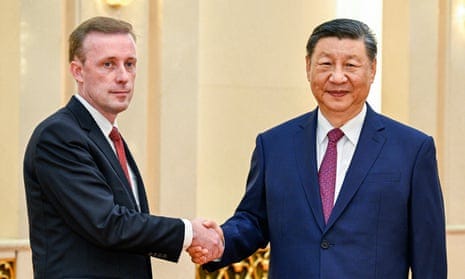
Xi Jinping holds surprise meeting with senior Biden aide in Beijing
Chinese leader speaks with Jake Sullivan, who was making his first visit to Beijing as US national security adviser
By Helen Davidson
Xi Jinping has spoken with the US national security adviser, Jake Sullivan, in a surprise meeting during the senior Biden aide’s three-day visit to Beijing.
The meeting on Thursday afternoon came after days of talks between Sullivan and senior Communist party officials including the foreign minister, Wang Yi, and a vice-chair of the central military commission believed to have the ear of Xi.
It was Sullivan’s first visit to Beijing as national security adviser, amid efforts to ease tensions in what US officials described as an “intensely competitive relationship”.
According to Chinese state media, Xi told Sullivan in the Great Hall of the People that he hoped the US could see China’s development in a positive light and would work with China “to find a right way for two major countries to get along with each other”.
“As two major countries, China and the United States should be responsible for history, for the people and for the world, and should be a source of stability for world peace and a propeller for common development,” he was quoted as saying.
Sullivan reportedly told Xi that Joe Biden was committed to managing the relationship to avoid conflict and “looks forward to engaging with you in coming weeks”.
Earlier on Thursday it was revealed that the two sides had agreed to plan a call between Xi and Biden. There are no known plans for the two leaders to meet again in person before the US election in November.
Wen-Ti Sung, a political scientist at the Australian National University, said: “Biden has reason to want to leave the world’s most important bilateral relations on a good footing on his way out, to cement for legacy. China has incentive to show a goodwill gesture towards the outgoing Biden administration in its closing days. In the hope of locking in a more conciliatory precedent, this can then constrain options for the next US administration.”
A White House readout said Sullivan and Xi also discussed Russia’s war against Ukraine, the South China Sea, and further implementation of bilateral commitments on counternarcotics, military-to-military communications and AI safety and risk.
The tone of the Xi meeting was markedly conciliatory after days of meetings between Sullivan and other officials in which, while they were described as substantive and productive, there were strong words traded over several intractable issues.
On Thursday Sullivan met Gen Zhang Youxia, the vice-chair of China’s central military commission. Zhang is the highest-ranking military official to have met the Biden administration. Sullivan described the meeting as a rare event and emphasised that both countries had a responsibility to prevent competition from veering into conflict or confrontation.
“Given the state of the world and the need for us to responsibly manage US-China relations, I think it’s a very important meeting,” Sullivan said.
The meeting produced a promising agreement for bilateral military talks at the theatre command level “in the near future”, but Zhang accused the US of “collusion” with Taiwan.
Zhang reportedly told Sullivan that promoting the “reunification” of Taiwan with the mainland was “the mission and responsibility” of the military. According to a White House readout, Sullivan emphasised the need for peace in the Taiwan strait and for freedom of navigation by foreign nations to be maintained.
Wang, the foreign minister, had also told Sullivan that Taiwan’s independence posed the greatest threat to stability in the immediate region, according to a Chinese statement. He demanded that the US “stop arming the island but support China’s peaceful unification”.
Sullivan, in turn, cautioned against the continuing military and economic coercion of Taiwan. He also expressed concern over China’s support for Russia’s defence industrial base, and its “destabilising” actions in the South China Sea in disputes with the Philippines. He raised the recent incursion by a Chinese warplane into Japan’s airspace.
Tense words had been expected before the meetings. On Sunday China’s foreign ministry published a lengthy statement on Beijing’s concerns and grievances with the US. Beijing considers Taiwan to be a Chinese province and has vowed to annex it. The US does not support Taiwan independence but facilitates weapons sales to its military for self-defence under statutory obligations, which angers Beijing.
“The Taiwan question is the first and foremost red line that must not be crossed in China-US relations,” the Chinese foreign ministry said.
Also before the meeting, a US state department official said the continuing communication was important but did not signify a change in approach to “an intensely competitive relationship”.
Speaking later on Thursday, Sullivan said the two parties reached no new agreements on the South China Sea and had “vigorous give and take” on economic security and trade issues. “We didn’t discuss the American election,” he added.

